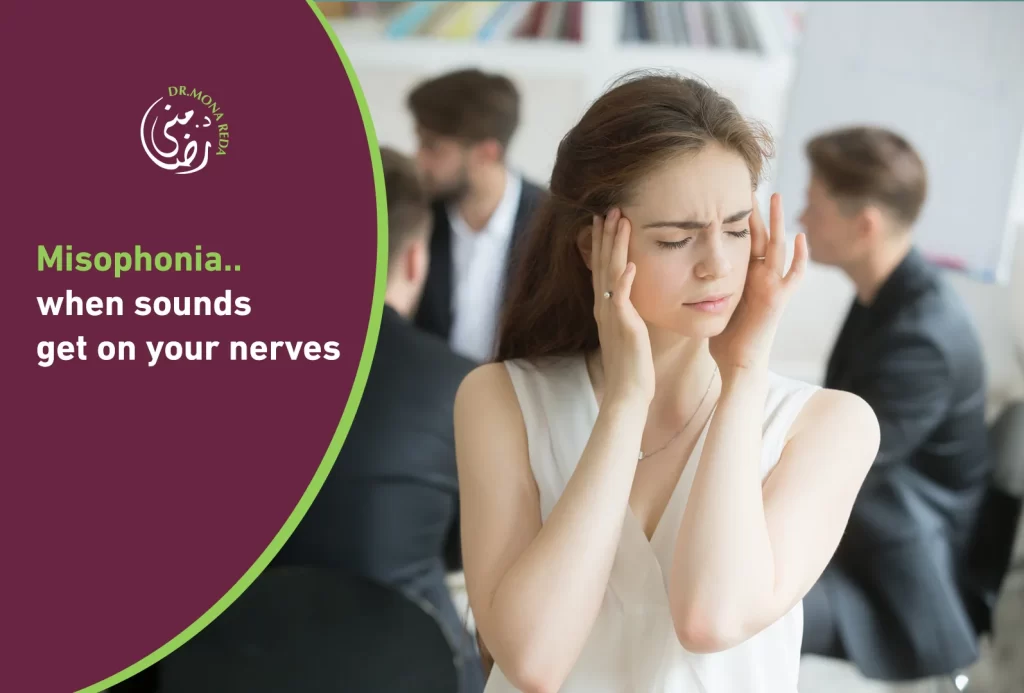Some people get upset and nerve-wracking by things that seem to be simple to others, such as loud or dim sounds, such as the sound of chewing food, the sound of writing with a pen on paper, or even the sound of the other’s breath.
In this article we will learn misophonia’s meaning and What are their causes and how to treat them?
What is Misophonia?
If you are so angry or disgusted when hearing certain voices that you are unable to control your reactions when hearing these voices, then you most likely suffer from misophonia.
Some people may have only one stimulating voice that infuriates them, and others can have many sounds.
Misophonia is a real disorder that greatly threatens performance and social communication and certainly adversely affects mental health, It usually appears between the ages of 9-13 years, and its impact may increase to the point of social isolation, avoiding being in places that may cause disturbing sounds to them
Causes of misophonia
Researchers didn’t arrive for the real reasons behind the misophonia, but the most important causes may be:
1. Genetic factor due to having someone in the family with this syndrome.
2. People with misophonia are more prone to brain disorders, one such disorder is the presence of more connections and activities in certain areas of the brain.
3. Breeding may play a role in the development of misophonia. People who have grown up in an environment with high and disturbing sounds are more sensitive to these sounds.
4. There may be an association between misophonia and some other neurological disorders such as anxiety disorders, personality disorders and depression disorders.
Symptoms of misophonia:
1. Anger and extreme disgust at some sounds such as the sounds of chewing food, breathing or repeating a particular sound.
2. Take aggressive physical or verbal actions toward the person making the noise.
3. physiological changes such as increased heart rate, sweating or muscle tension.
Is misophonia a mental illness?
Misophonia is not necessarily a psychiatric condition in which people experience an excessive response to certain small sounds or movements. However, misophonia may sometimes be associated with certain psychiatric disorders such as anxiety, depression and sleep disorders which can cause psychological and social stress due to the difficulty of dealing with disturbing sounds.
In these cases, there may be a need for psychotherapy to help a person cope with psychological feelings and challenges associated with misophonia.
Methods of treating misophonia
There are currently no treatments specifically designed to treat misophonia. However, treatment aims to help people with this condition cope with stimuli and reduce stress.
The most important treatments that can be used are:
1. Cognitive Behavioral Therapy: A form of speech therapy that can help people reformulate their thoughts and emotions regarding voice release, during sessions therapists can help you develop coping strategies and change how you respond to stimuli.
2. Tinnitus retraining treatment: It aims to retrain the brain’s response to sounds by combining vocal therapy with indicative techniques, as well as learning to use relaxation techniques to reduce severe reactions when exposed to pathogens.
3. Medications: Some healthcare providers may propose psychiatric drugs that treat simultaneous common conditions such as anxiety and depression to reduce symptoms of misophonia and emotional response.
If you are deeply disturbed by the sounds that seem ordinary to others, you can contact Dr. Mona Redad, a psychiatrist to check on your mental health and feel calm and comfortable.
Resources:
Understanding Misophonia
Symptoms of misophonia
How do you treat it?









